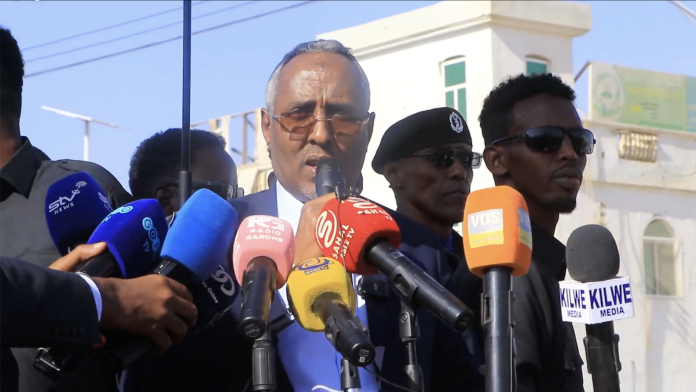GAROWE (KAAB TV) – Somalia’s Foreign Affairs Minister, Abshir Omar Jama, widely known as Huruse, announced his resignation on Monday, December 18, to vie for the presidency in the semi-autonomous state of Puntland.
However, as the political landscape shifts, questions arise about the source of funding for Huruse’s presidential campaign.
In his resignation memo, seen by our reporter, Huruse stated, “I am leaving this position on my own personal decision and to join, get time, and independence for the campaign for the election of the president of the Somali state of Puntland.”
Huruse, hailing from Puntland clans, held the foreign affairs portfolio for just a year and a half under President Hassan Sheikh Mohamud and Prime Minister Hamza Abdi Barre.
Even within the foreign ministry, he largely remained less influential and critics argue that his significance was overshadowed by the presence of President Mohamud’s daughter, who serves as the president’s adviser for International affairs—a role unprecedented in previous administrations.
Sources from Puntland and Mogadishu suggest that Huruse has been receiving support from President Hassan Sheikh Mohamud, who has had strained relations with Puntland leader Said Abdullahi Deni.
The move comes amid criticism from clan elders directed at President Mohamud for his remarks in May, publicly opposing the proposed 1 person 1 vote in Puntland and warning of potential violence leading to armed opposition to the direct vote resulted in deadly confrontations in and outside Garowe, Puntland’s capital.
Huruse’s presidential bid kicks off in Garowe on Monday where he was welcomed by crowds, but notably, thanks to the violence, he is not concerned about the 1 person 1 vote system, a right favored by many citizens, including women, as it would empower them to elect leaders and participate in decision-making.
In this upcoming election scheduled for January 8, 2024, once again, it will be the clan elders responsible for choosing 66 members of the regional parliament, who will subsequently select a new president. This aligns with President Hassan Sheikh Mohamud’s preference, and their favored candidate is now in the running.
But a significant challenge emerges within Huruse’s bid, as recent reports reveal that a local hotel ceased operations after the entire building was allegedly rented for Huruse’s campaign activities.
The extent of the financial commitment remains speculative, raising concerns about transparency and accountability.
The critical question remains: Where is the funding coming from? With Huruse seen as Villa Somalia’s favored candidate, speculation arises that campaign funding may originate from Mogadishu, mirroring patterns observed in the past.
As Huruse embarks on his presidential journey, the origins of the financial backing are poised to become a central point of scrutiny in the unfolding political landscape.


